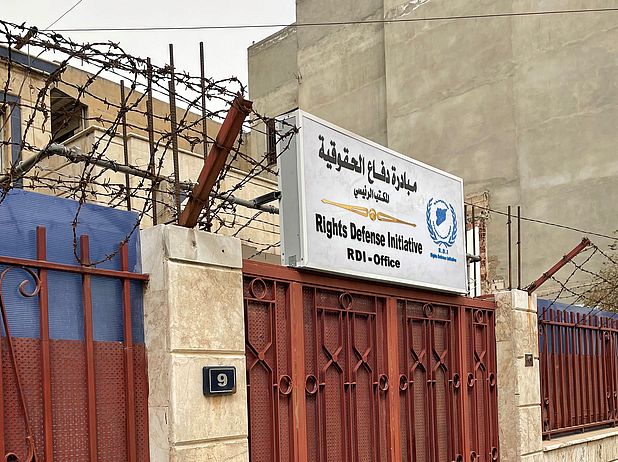By Andreas Schüller
Justice and accountability for Syria are for more than ten years now on the international agenda. Especially in Germany and a few other European countries, large-scale investigations and a number of prosecutions have taken place. Among them, the judgments in the so called al-Khatib trial by the Higher Regional Court in Koblenz against two former Assad-regime officers as well as convictions for the genocide against the Yezidi by other courts stand out. On the other hand, many crimes committed by the Assad-regime, non-state or international actors have not been brought before courts so far. This concerns inter alia northeastern Syria, including crimes committed by Turkey and member states of the anti-ISIS coalition.
Lack of access to international courts.
Due to the region's special status, survivors and civil society groups can expect limited government support in seeking legal accountability and prosecution for indiscriminate attacks on civilians:inside, killings, torture, and disappearances. The Kurdish self-government, which since 2018 has operated under the official name of the Autonomous Administration of Northern and Eastern Syria (AANES), faces a host of challenges. On the one hand, it faces continued instability and limited access to international mechanisms due to its lack of recognition under international law. On the other hand, survivors of human rights crimes also cannot rely on the Syrian regime itself to bring cases before international courts, as it is highly likely that any investigation of criminal conduct would also involve the crimes of the Syrian state itself.
Moreover, the International Criminal Court (ICC) is not available as a legal forum because Syria is not a party to the Rome Statute and does not recognize the Court's jurisdiction. While the UN Security Council can refer the situation in Syria as such to the ICC's prosecutorial authority, this would certainly be subject to a veto by Russia. The procedure that Ukraine has used to ask the ICC to investigate is, again, not available to AANOS. Under this procedure, an ad hoc declaration under Article 12(3) may be submitted to the ICC by states that are not parties to the Statute but nevertheless wish to recognize the ICC's jurisdiction. However, this procedure is limited to nation-states and cannot be triggered by the autonomous region that AANOS is seeking to establish.
However, even if the region were to be granted constitutional status as a semi-autonomous region within a democratic Syria, this status would not create any new opportunities with regard to state-oriented institutions such as the ICC or, indeed, the International Court of Justice (ICJ).
Because AANOS is not recognized, it is equally difficult for them to access or apply for mechanisms regarding the prosecution of former ISIS members. Tens of thousands of former ISIS members remain in detention or camps within the self-ruled region of.
Lack of political will
But the possibility of establishing non-criminal liability for violations of international law are also rather limited for the region of northeastern Syria
Although many former ISIS fighters have traveled to the region from European countries, AANOS has been unable to enter into or conclude formal extradition agreements due to its lack of recognition as a state. The government has called for the establishment of an international war crimes tribunal within its borders, but few countries have been willing to lend legitimacy to Kurdish self-rule by supporting such a project. Calls for a joint tribunal between the self-government and anti-IS coalition forces also met with obstacles. Instead, trials could only continue in local courts that have already tried and convicted thousands of ISIS suspects.
While it is difficult for AANOS to engage in forums limited to state parties, survivors and civil society groups from all regions of Syria can, at least in theory, avail themselves of investigative mechanisms established specifically to gather evidence of violations of international law committed on Syrian territory. These include the International, Impartial, and Independent Mechanism (IIIM), established by the United Nations General Assembly to "collect, consolidate, preserve, and analyze" evidence for subsequent prosecution of atrocities committed in Syria since March 2011. The Independent International Commission of Inquiry on the Syrian Arab Republic, established by the U.N. Human Rights Council in April 2011 to "investigate all alleged violations of international human rights law and to determine the facts and circumstances of such violations and the crimes committed," is also part of this effort. The example of rapid and widespread cooperation among Europe's national prosecutors in investigating evidence of key international crimes following Russia's invasion of Ukraine this year shows that, with political will, it is possible to mobilize new means of gathering evidence.
Isolated conviction
However, due to the principle of a universally applicable principle of world law, which makes it possible to prosecute international crimes worldwide regardless of the nationality of the perpetrator, the victim, or the location of the crime, investigations into trials to determine individual criminal responsibility can still be conducted in different national legal systems. For example, in February 2021, the Koblenz Higher Regional Court sentenced a former employee of the Syrian intelligence service, Eyad A., to life imprisonment for crimes against humanity, and a year later sentenced his superior, Anwar R.
Role of Turkey
While Syria is not a party to any regional human rights mechanism, Turkey is a state party to the European Convention for the Protection of Human Rights and Fundamental Freedoms, which is subject to the jurisdiction of the European Court of Human Rights (ECtHR). The country can therefore be held responsible for violations of the Convention's norms not only within its borders, but also in areas under its effective military and administrative control.
The extent of Turkey's occupation of northeastern Syria likely meets the requirements for a finding of jurisdiction over that region. However, the Court has not yet ruled on cases of violations under Turkish control in Syria, but a ruling by the ECtHR could lead to compensation for Syrian victims and focus international attention on Turkey's responsibility for the actions of its troops and affiliated militias
Law and justice
Regarding allegations of human rights violations by the self-government itself, strengthening its internal disciplinary and criminal system would ensure that AANOS complies with international fair trial standards. Survivors would thus have more local avenues to seek legal accountability, in addition to international investigative mechanisms, criminal proceedings in third countries under the universal world rights principle, or the European Court of Human Rights.
Justice, as it turns out, is not an easy task, and its discussion and demand is conditional. Ultimately, it requires the political will to create and facilitate the necessary structures, access and resources.
Andreas Schüller is head of the program area of international crimes and legal responsibility at ECCHR (European Center for Constitutional and Human Rights).


